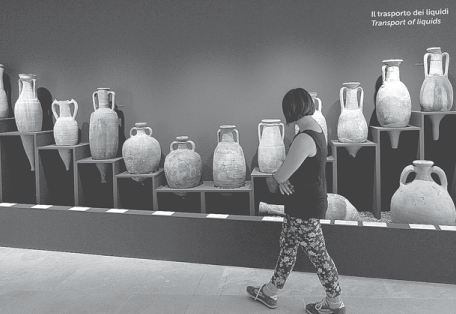Thank ancient Romans for 'street food'
Updated: 2015-08-08 13:04
By Laure Brumont(China Daily)
|
||||||||
Grabbing something hot and tasty on the move? You have the ancient Romans to thank. "Street food" was their invention, generally enjoyed with wine, gambling or even prostitutes.
Food on the go was an integral part of daily life in the empire, from nibbling on salted peas while watching gladiators battle in the Colosseum, to grabbing a sausage or fried fish snack after a dip in Rome's famed baths.
Feeding an empire of some 50 million people was no mean feat, as an exhibition in the Italian capital sets out to show in conjunction with Milan's 2015 Universal Exhibition on the themes of food and agriculture, running until the end of October.
Food scarcity could trigger uprisings or even topple leaders, a risk Emperor Augustus (63 BC to 14 AD) was unwilling to take. He made importing wheat, oil, wine and other foodstuffs a top priority, changing the face of Roman dining.
A typical day kicked off with the jentaculum, or breakfast-salted bread, dried fruit and eggs washed down with milk or wine.
That was followed by a quick prandium, or lunch, grabbed at the thermopolia-forerunners of fast food restaurants-or popinae, wine bars frequented by the lower classes where customers could grab a bite, dabble in a bit of gambling, or pop upstairs for some sex.
And after an afternoon's work or session at the thermal baths, the rich would throw sumptuous banquets, dining on anything from peacock tongues to baked dormice.
The rest of the population supped on fresh vegetables, stews and, occasionally, meat.
- Some 200 migrants believed dead in Mediterranean shipwreck
- Chinese FM rejects Philippine, Japanese, US claims on South China Sea issue
- 'Major breakthrough' may help solve riddle
- Hiroshima marks 70th anniversary of bombing
- World 'watching' Japan's next move
- Migrant boat capsizes in Mediterranean, at least 25 dead

 30 historic and cultural neighborhoods to visit in China
30 historic and cultural neighborhoods to visit in China
 Beijing Museum of Natural History unveils 'Night at the Museum'
Beijing Museum of Natural History unveils 'Night at the Museum'
 Sun Yang wins third consecutive 800m free gold at worlds
Sun Yang wins third consecutive 800m free gold at worlds
 Aerial escape
Aerial escape
 Freshmen of top universities from poorer families work part time to reduce family burden
Freshmen of top universities from poorer families work part time to reduce family burden
 17 armed forces take part in Russia military contest
17 armed forces take part in Russia military contest
 A glimpse of traditional Chinese business blocks
A glimpse of traditional Chinese business blocks
 Top 5 most popular drones in China
Top 5 most popular drones in China
Most Viewed
Editor's Picks

|

|

|

|

|

|
Today's Top News
China willing to work with US to contribute to world peace, stability
China asks further investigation on MH370
Police fatally shoot ax-wielding man at Nashville movie theater
Study-abroad tours in US booming
Malaysia confirms plane debris is from Flight MH370
IMF to study yuan inclusion
LA clinic seeks fertility-market access
China and US discuss ways to fight terror
US Weekly

|

|







